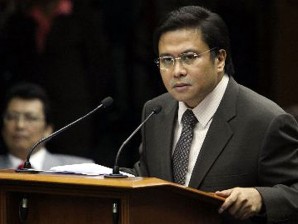A senator-judge is being haunted by the ghost of an impeachment past.
Jose “Jinggoy” Estrada, Senate president pro tempore, on Tuesday noted some eerie similarities between the trial of Chief Justice Renato Corona and that of his father, former President Joseph Estrada, more than a decade ago.
Estrada, who is sitting as a judge in the Corona trial, assailed the prosecution’s alleged effort to “demonize” Corona by presenting supposed evidence against him in public.
“It’s reminiscent of the impeachment trial of my father 11 years ago,” he told the Philippine Daily Inquirer in a phone interview. “It happened to my father before. They demonized him in media and in public until they got public opinion on their side. It’s the same pattern.”
But the younger Estrada sought to clarify that he was not necessarily throwing his support behind the Chief Justice. He said he just wanted to stress that “the decision of senator-judges should be based on the evidence presented in court, not before the bar of public opinion.”
Such is also the sentiment of Corona’s defense counsels, who alleged that prosecutors were arguing their case before the media because their evidence could not stand in court.
Representative Edgardo “Sonny” Angara, a spokesperson for the prosecution, on Tuesday said it was “still too early in the game” to determine who was getting the upper hand.
Just marked, not presented
Senate Majority Leader Vicente Sotto III clarified reports that documents submitted to the impeachment court last week were just “marked” and not yet “presented as evidence” against Corona.
But defense counsel Tranquil Salvador III noted that the prosecutors were claiming outside the impeachment court that Corona’s properties were “undervalued.” The allegation was tackled in a press conference last Thursday, after copies of Corona’s statements of assets, liabilities and net worth (SALNs) were marked in court.
Estrada said the prosecution should not resort to a “fishing expedition” for evidence like what he believed happened in the case of his father.
At the time, stories about then President Estrada’s mansions and other ill-gotten wealth were all over the news even before the impeachment trial began. The senator said the “demonization” convinced the public that his father was guilty.
“That was not proper. We have a process and it has to be respected,” he said.
‘Communication strategy’
Defense counsel Ramon Esguerra earlier said that his team was “losing” in terms of public opinion. He said part of it had to do with the prosecution’s communication—not legal—strategy.
Salvador agreed with the observation, saying defense lawyers were still “learning” how to properly communicate their position in public.
“You have to give it to the prosecution. In a sense, they packaged the trial in a political theater,” he said in a phone interview.
“But to those who understand, they know honestly what’s happening inside the courtroom, that we were able to do this and do that. So I’m surprised that when we go outside, the story is different.”
